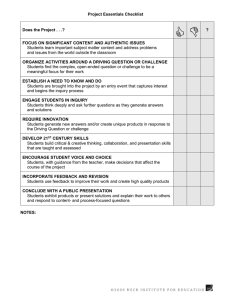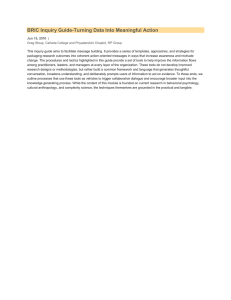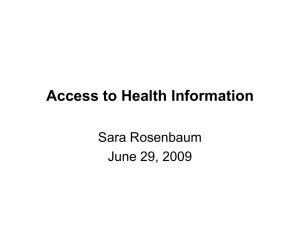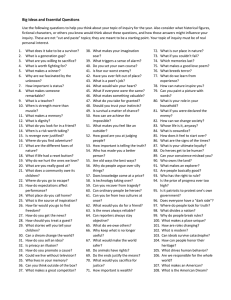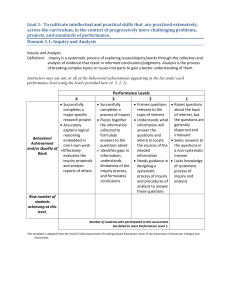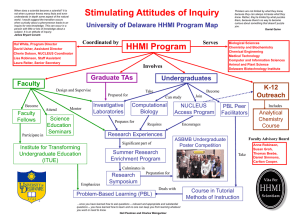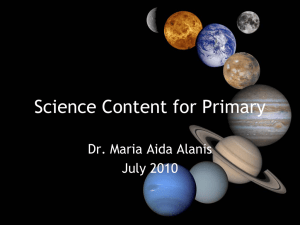File
advertisement
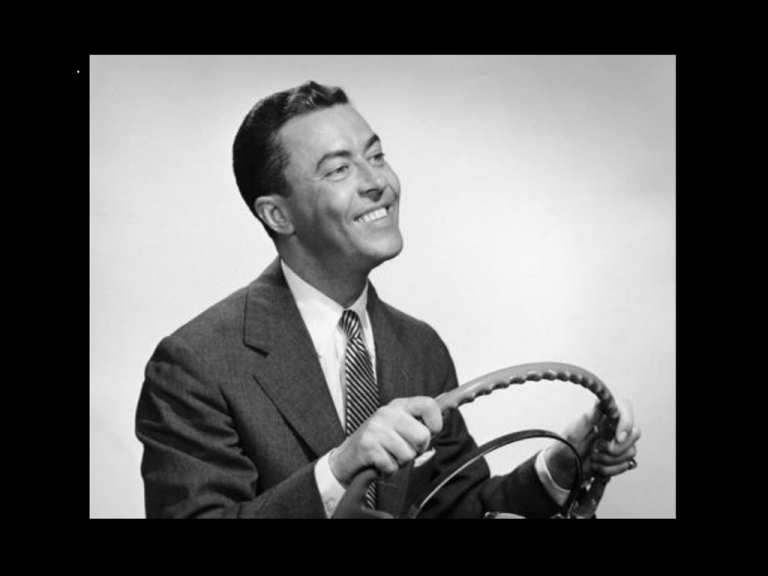
. Thug thesis. Some Problems with the Bully Thesis 1. It limits what students can write about. 1. It reinforces simplistic ideas about the nature of knowledge. 1. It suggests that deductive reasoning is the best method of solving complicated problems. 1. Begins with questions not answers. 2. Discovery is seeded with uncertainty, willingly tolerated over time. 3. Emphasizes induction over deduction. Conditions of Inquiry? Open (to find out) How do I know what I think until I see what I say? I know what I think, now how can I say it? Question Purpose Invention “Essay” Direct (to prove or explain) Arrangement Thesis-proof, Fiveparagraph theme Teaching the Question Is Elvis dead? What does the enduring belief among some that Elvis is still alive say about the nature of celebrity in our culture? What is a researchable question? • • • • Raises more questions. The right size. Writer is curious. Implies method of answering. • Audience has stake in answer. • Something has been already said. Myth of the Boring Topic • No such thing as boring topic, only bad questions • Suspend judgment and tolerate ambiguity • Extend the process of open inquiry • Questions are like knives • The more you look the more you see Know little Questions of fact or definition: What is known? What is it? What good is it? (Value) What is the best explanation? (Hypothesis) What is the relationship? (Analogy and Comparison) What should be done? (Policy) What does it mean (Interpretation) What do the facts suggest is true? (Proposition) Know a lot Cognitive Load Resistance Question-asking Reading Motivation Low Knowledge Moderate Knowledge High Knowledge Dialogic Reasoning Fastwrite Exercise Imagine a room you spent a lot of time in as a child. Put yourself back there. Drawing on all of your senses, fastwrite for seven minutes, beginning with that room. What do you see, what do you hear, what do you smell, what do you feel? Write in present tense. Skip a line. Compose a fat paragraph, beginning with this line: What I understand now about this time in my life that I didn’t understand then was… Dialectical Thinking So What ? True friends are hard to find. Mountain At a point in your life when everything familiar changes, even your sense of identity, then old friends can become uneasy reminder of who you were, not who you want to be. Sea He didn’t look me in the eyes when he said that, and I knew something had changed that October night. Strategy for Inquiry Creative Thinking Sea Fastwriting Showing Specifics Collecting Observations of What happened Then Generating Exploring Seeing Playing Critical Thinking Mountain Composing Telling Generalities Focusing Ideas about What happens Now Criticizing Reflecting Interpreting Judging Portion of men whose attractiveness is judged by U.S. women to be “worse than average” : 4/5 Portion of women about whom U.S. men say this : 2/5 “Conversing” with Sources • Especially in the United States, where cell phone use still remains low compared to other countries, we are rapidly approaching a tipping point with this technology. How has it changed our behavior, and how might it continue to do so? What new rules ought we to impose on its use? Most importantly, how has the wireless telephone encouraged us to connect individually but disconnect socially, ceding, in the process, much that was civil and civilized about the use of public space? Christine Rosen, "Our Cell Phones, Ourselves," The New Atlantis, Number 6, Summer 2004, pp. 26-45. Continuing the “Conversation” • Why do these cell phone conversations bother us more than listening to two strangers chatter in person about their evening plans or listening to a parent scold a recalcitrant child? Those conversations are quantitatively greater, since we hear both sides of the discussion—so why are they nevertheless experienced as qualitatively different? More Conversation • Cocooned within our “Personal Area Networks” and wirelessly transported to other spaces, we are becoming increasingly immune to the boundaries and realities of physical space. As one reporter for the Los Angeles Times said, in exasperation, “Go ahead, floss in the elevator. You’re busy; you can’t be expected to wait until you can find a bathroom.… [T]he world out there? It’s just a backdrop, as movable and transient as a fake skyline on a studio lot.” Mini-Inquiry Project Experts see patterns that novices fail to notice. 1. Organize data into logical categories 2. Choose one category and eliminate the rest of the cards for now. 3. Identify patterns in some of the remaining data: • Narrative • Analogy • Problem/solution • Effect/cause or cause/effect • Correlation • Contradiction 4. Draft an inquiry question from the data in the form of a relationship question: What might be the relationship between _____ and _____? Or offer a theory that might explain the data.
